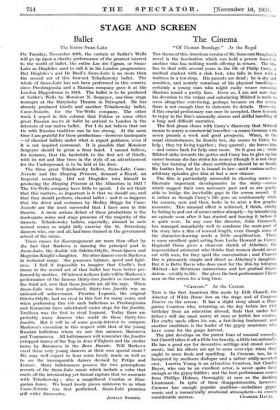The Cinema
"Of Human Bondage." At the Regal TITm theme of this American version of Mr. Somerset Maughanis novel is the fascination which can hold a person bound to another who has nothing worth offering in return. The film has to deal with several years in the life of Philip Carey, a medical student with a club foot, who falls in love with a waitress in a tea-shop. His parents are dead ; he is shy and sensitive, and acutely conscious of his physical handicap–. certainly a young man who might easily weave romantic illusions round a pretty face. Even so, I am not sure that his devotion to the vulgar and calculating Mildred is made to seem altogether convincing, perhapi because on the screen there is not enough time to elaborate its details. However, if this crucial preliminary can once be accepted, there is much to enjoy in the film's unusually sincere and skilful handling of a long and difficult narrative.
The first phase closes with Carey's discovery that Mildred means to marry a commercial traveller—a coarse German with seven pounds a week and good prospects. When, in the usual circumstances, he deserts her, she comes to Carey for help ; they try living together ; they quarrel ; she leaves hint —and comes back for help once more. So it goes on ; while Mildred sinks towards the gutter and Carey has to give up his career because she has stolen his money (though it is not clear why her burning of the share certificates should be so fatal). He loathes her, but he is bound to her—until various rather arbitrary episodes give him at last a new chance.
The film is particularly successful in choosing scenes to illustrate important developments in the story—scenes which suggest their own necessary past and so are partly able to bridge the inevitable gaps in the screen record. It is rather as though Carey's life goes on continuously while the camera, now and then, looks in to seize a few graphic moments. This unusual effect is achieved, I think, chiefly by fading in and out of scenes rather abruptly—by introducing an episode soon after it has started and leaving it before it is quite over. In any case the director, John Cromwell, has managed remarkably well to condense the main part of the story into a film of normal length, even though some of the character-drawing needs a little amplification. There is some excellent quiet acting from Leslie Howard as Carey; Reginald Owen gives a clear-cut sketch of Athelney, the impoverished aristocrat who thinks that women should never eat with men, for they spoil the conversation ; and Frances Dee is pleasantly simple and direct as Athelney's daughter. But it is Bette Davis who does most for the film by bringing Mildred—her flirtatious mannerisms and her gradual degra- dation—vividly to life. She gives the best performance I have seen on the screen for a long time.






































 Previous page
Previous page